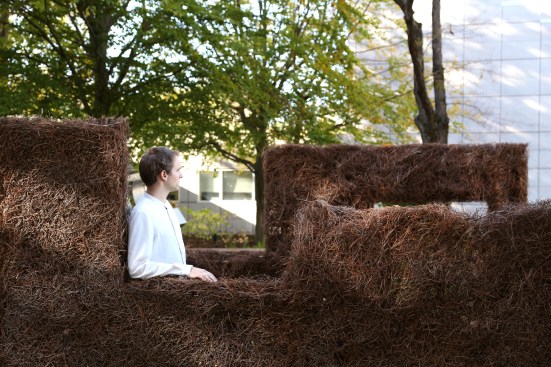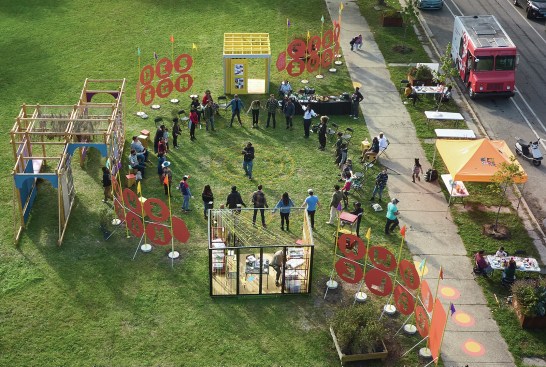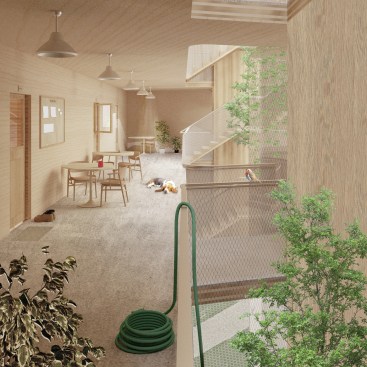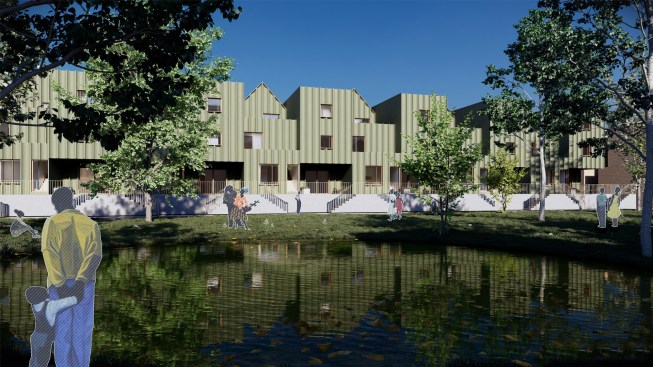Each spring, the Architectural League of New York names winners for its Prize for Young Architects + Designers, celebrating early career professionals less than a decade out from bachelor’s or master’s degree programs. With the award now in its 42nd cycle, the League has announced the class for its 2023 Prize, which asked entrants to consider the theme “Uncomfortable.”
“As young designers, we are wrestling with numerous uncomfortable responsibilities: dismantling architectural legacies, challenging traditional paradigms, grappling with the costs of comfort, responding to ecological concerns,” states a description from the League. “Our many discomforts range in scale, context, and urgency. […] From climate change to labor practices, the sources of our discomfort demand both critical reflection and collective imagination. Are you restless within the discipline’s status quo? How do you respond to discomfort? Whose comfort matters?”
The winners of the prize will participate in virtual and in-person programming with the League, including work installations and a Zoom-based lecture series beginning in mid-June.
The jury for the 2023 prize comprised José Amozurrutia, Germane Barnes, Jennifer Bonner, Barbara Bestor, FAIA, Wonne Ickx, Int. Assoc. AIA, Kyle Miller, Tya Winn, and the Young Architects + Designers Committee. See the winners of the 2023 Architectural League Prize for Young Architects + Designers below.
The Winners

courtesy After Architecture
Homegrown
Katie MacDonald, AIA, and Kyle Schumann of After Architecture, Charlottesville, Va.
From the League: Katie MacDonald and Kyle Schumann founded After Architecture in 2012 as undergraduates at Cornell University. In response to the construction industry’s complicity in the environmental crisis, the Charlottesville, Va.–based studio advocates for resurfacing and advancing sustainable preindustrial building techniques and materials. Simultaneously low- and high-tech, it pairs emerging computational technologies with locally-sourced biogenic materials to produce a distinct formal language “reframing the relationship between biology, technology, and authorship,” in the words of the firm.
You can read more about After Architecture, an ARCHITECT Next Progressives firm and 2022 ARCHITECT R+D Award winner, here.

Christopher Sherman
Don’t Let Me Be Lonely, South Algonquin, Canada, 2021, by Common Accounts, MyHaven GreenVision Homes, Moses Structural Engineers
Miles Gertler of Common Accounts, Toronto and Madrid
From the League: Miles Gertler founded Common Accounts with Igor Bragado in 2016. In its own words, the Toronto- and Madrid-based experimental design studio is “tethered more to networks of peers, politics, and file storage than we are to traditional notions of place and practice.” Through a variety of media, it engages with the everyday—though sometimes taboo—spatial and technological protocols surrounding self-design and the human body. Exploring subjects from fitness and cosmetic surgery to funerals and deathcare, the studio’s bold experimentations push both design and public discourse beyond their comfort zones.

Brian Griffin
Chicago Sukkah Design Festival (2022), by Could Be Design, Lawndale Pop-Up Spot, Nekita Thomas
Joseph Altshuler and Zack Morrison of Could Be Design, Chicago and Urbana, Ill.
From the League: Joseph Altshuler and Zack Morrison founded Could Be Design in 2015. The Chicago- and Urbana, Ill.-based design practice imagines the built environment as an animate being with agency of its own. Using vibrant colors and whimsical shapes, Could Be Design’s projects celebrate this animacy, inviting users “to find comfort (and even delight) in the discomfort and humility integral to a world in which humans do not claim a privileged dominance,” in the studio’s words. From exuberant commercial interiors to interactive public art, the practice embraces the joy of creative placemaking.
You can read more about Could be Design, an ARCHITECT Next Progressives firm (formerly called Could be Architecture), here.

Sarah Aziz/Lindsey Krug
Going Nowhere Fast, Lake Forest, Ill. (2021), by Sarah Aziz, Lindsey Krug
Sarah Aziz and Lindsey Krug, Albuquerque, N.M., Chicago, and Milwaukee, Wisc.
From the League: Based in Albuquerque, N.M., Sarah Aziz is a designer who researches patterns of migration across scales and contexts. Lindsey Krug, based in Chicago and Milwaukee, is a designer who focuses on the role of the built environment in reifying bodily taboos and inequities. Since 2020, Aziz and Krug have shared a long-distance design and research practice. They investigate and unsettle the overlooked and the everyday, from dollar stores to tumbleweed, through provocative graphics, research, and installations.

Studio Ames
Supportive Housing Project, Bronx, N.Y. (2022), by Studio Ames
Daisy Ames of Studio Ames, New York
From the League: Daisy Ames founded Studio Ames in New York City in 2017. The architectural research and design office responds to two of the built environment’s most pressing crises: the housing crisis and the climate crisis. Intervening at the nexus of the two, the practice’s work examines housing policy, segregation, and repression as well as sustainable construction materials and techniques. The results illuminate often-invisible elements of the built environment and offer a challenge to traditional domestic paradigms.

Studio Sean Canty
Block, House, Commons (unbuilt), Philadelphia (2021), by Studio Sean Canty, AKTII Engineering
Sean Canty of Studio Sean Canty, Boston
From the League: Sean Canty founded his eponymous practice in Boston in 2017. The studio engages in geometrical explorations, asking social questions of traditional housing typologies and architectural forms. In its own words, Studio Sean Canty aims “to help establish a new normal in residential design, one that foregrounds collectivity, communal living, and higher density.” Through spatial contortions and remixes, Canty’s designs embrace both the social and formal tensions internal to each project
